2022 Litigation Report: How Republicans Lost and Voters Won in Court

Over the course of 2022, Democracy Docket covered and tracked activity in the courts pertaining to voting rights, elections, redistricting and democracy. As the year progressed, we saw a steep jump in lawsuits filed by anti-voting advocates. When the fight over voting rights shifted from legislative chambers to courtrooms this year, courts overwhelmingly protected the right to vote, particularly in advance of the midterm elections.
Between Jan. 1 and Dec. 31, 2022, we tracked:
- 175 new democracy-related lawsuits filed across 31 states.
- 175 court orders that impacted voters across 28 states.
The statistics in this report are based on the lawsuits in our database as of Dec. 31, 2022. For the purposes of this report, the 58 active redistricting lawsuits we’re tracking were excluded from our analysis in order to isolate cases focused on voting laws, election administration and election-related litigation, which we refer to as “democracy-related” litigation throughout this report.
Throughout 2022, we tracked 175 new democracy-related lawsuits across 31 states.
2022 was an especially busy year for democracy in the courts as the midterm elections took place on Nov. 8. Below, we analyze and break down our vast dataset of lawsuits that were filed in 2022 in order to make sense of the broader trends and patterns that characterized last year’s litigation landscape.
There were more anti-voting lawsuits than pro-voting ones filed in 2022.
We categorized the 175 lawsuits filed in 2022 as either “pro-voting” or “anti-voting.” In total, we tracked 93 anti-voting lawsuits and 82 pro-voting lawsuits that were filed in 2022. By comparison, in 2020 — another litigious election year — there were 150 democracy-related lawsuits filed, 95 of which were anti-voting and 55 of which were pro-voting.
We categorize a lawsuit as “pro-voting” if it seeks to protect or expand the right to vote. These lawsuits are often filed by national and state Democratic parties, affiliates and officials or nonpartisan and progressive groups whose missions center around making voting accessible for all eligible voters as well as promoting free and fair elections. In contrast, we define “anti-voting” lawsuits as those that seek to suppress voting through tactics such as tightening the rules around voter registration, adding more obstacles to mail-in or in-person voting processes and more. These lawsuits are often filed by national and state Republican parties, affiliates and officials, Republican voters or known conservative legal groups.
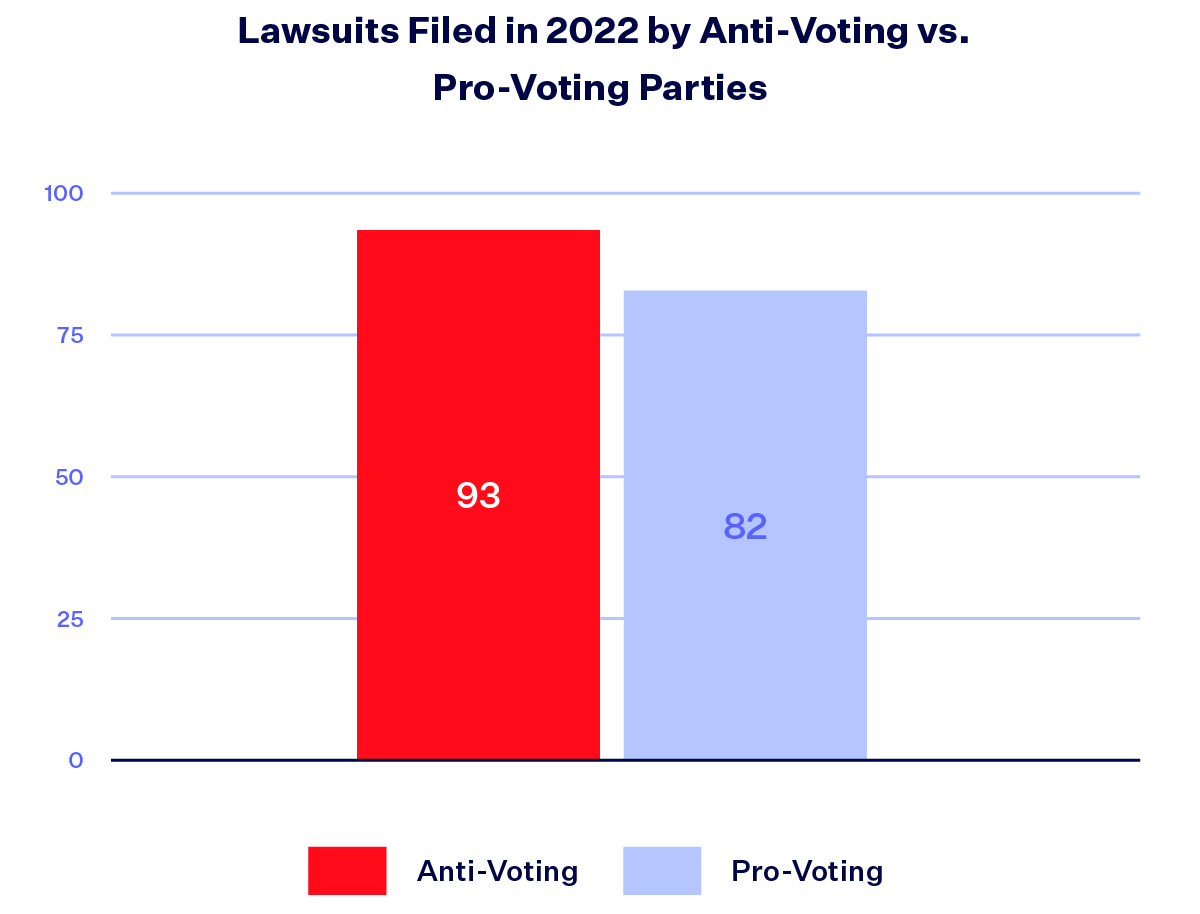
In 2022, the GOP filed a striking number of anti-voting lawsuits.
Within the buckets of pro-voting and anti-voting lawsuits, we examined the number of cases that were proactively filed by the Republican Party compared to those proactively filed by the Democratic Party. We consider proactive Republican Party lawsuits to be anything filed by the Republican National Committee, the National Republican Senatorial Committee, the National Republican Congressional Committee or state or county Republican parties. We consider proactive Democratic Party lawsuits to be anything filed by the Democratic National Committee, the Democratic Senatorial Campaign Committee, the Democratic Congressional Campaign Committee or state or county Democratic parties.
Out of the 175 lawsuits filed in 2022, we found that the Republican Party filed 23 lawsuits while the Democratic Party filed only six. Within the category of anti-voting lawsuits defined above, nearly 25% of lawsuits filed in 2022 were brought by the Republican Party. In contrast, out of the pro-voting lawsuits, only 7% were brought by the Democratic Party. Evidently, the GOP establishment is becoming more litigious than ever and is turning to courts to achieve its anti-voting and anti-democracy ends. On the other hand, the Democratic Party is using the courts more sparingly, with other nonpartisan and civic engagement organizations fighting in the courts to attain pro-voting outcomes as well.
In addition, 25 lawsuits were filed by individual GOP candidates who were not backed by an official Republican committee or party. These Republican candidates, many of whom were election deniers, filed lawsuits right before and after the 2022 midterm elections. For instance, a slate of far-right statewide candidates in Arizona filed lawsuits after Election Day contesting the results of the 2022 midterm elections — without the help of their party.
Last year, we also monitored a high number of “fringe” anti-voting lawsuits.
Within the realm of anti-voting lawsuits, there were also a noticeable number of lawsuits steeped in baseless conspiracy theories and unfounded claims. We refer to this narrower subset of anti-voting lawsuits as “fringe” and define them as lawsuits filed by individuals or groups that promote the “Big Lie” and/or have scant evidence to support their claims. Often, these sorts of lawsuits were filed years after the relevant issue raised in the case. Although one might rightly consider these types of lawsuits to be an aberration, Democracy Docket tracked a total of 23 “fringe” lawsuits in our larger dataset of cases filed last year. Along with fringe lawsuits challenging electronic voting equipment, we saw a handful of conspiracy-ridden lawsuits crop up in 2022 — in states including Arizona, Kansas and Michigan — that sought to decertify the results of the 2020 election an entire two years after it occurred.
There was a steady rise in the number of new lawsuits filed each month in the run up to Election Day.
Our tracking demonstrated a steady increase in the number of new lawsuits filed each month leading up to the 2022 midterm elections. Specifically, between the months of June and October, the total number of new lawsuits filed each month increased at a fairly steady rate. However, by the time we reached November, there was a dramatic surge of new lawsuits — the number of lawsuits filed in November (47) nearly doubled from October (24).
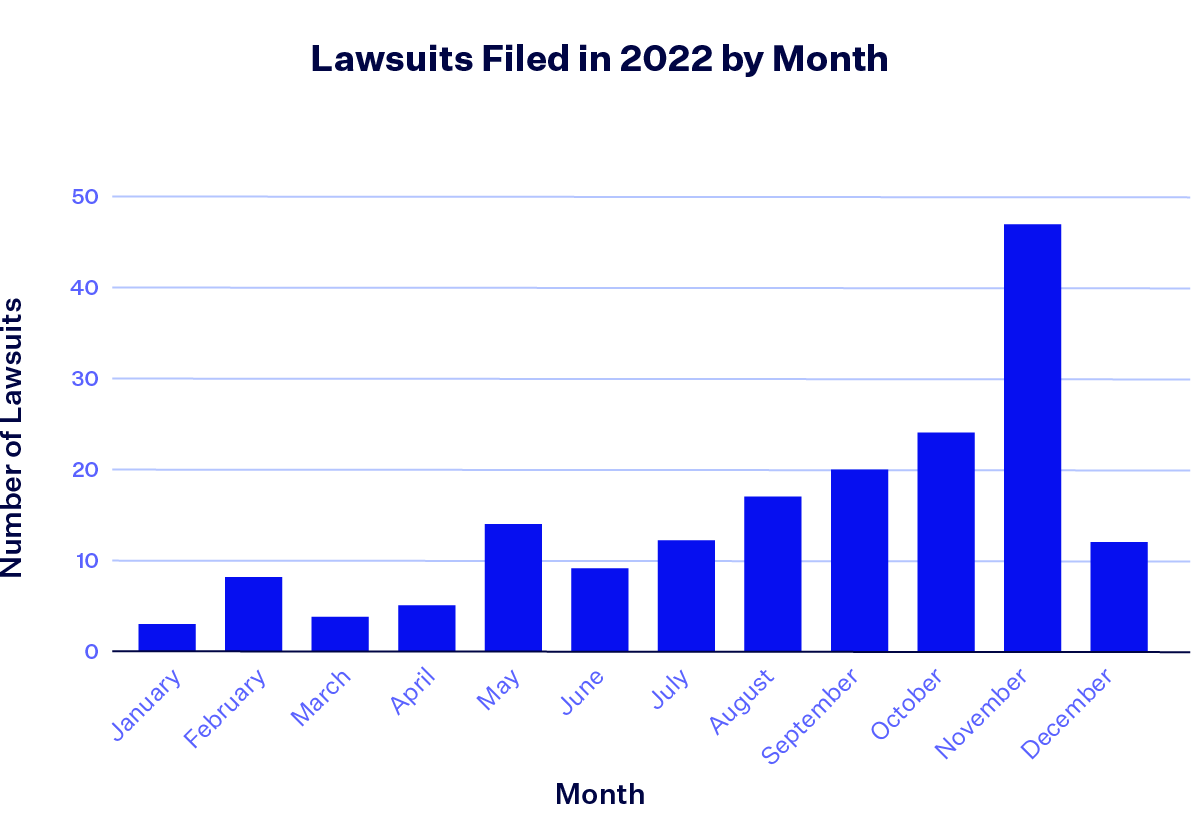
Of the 47 lawsuits that were filed in November, 15 were filed before Election Day, many with consequential outcomes for voters. On Election Day, Nov. 8, 10 lawsuits were filed. In the time period between Election Day and Nov. 30, a total of 22 lawsuits were filed.
Arizona, Pennsylvania and Wisconsin had the highest concentration of lawsuits.
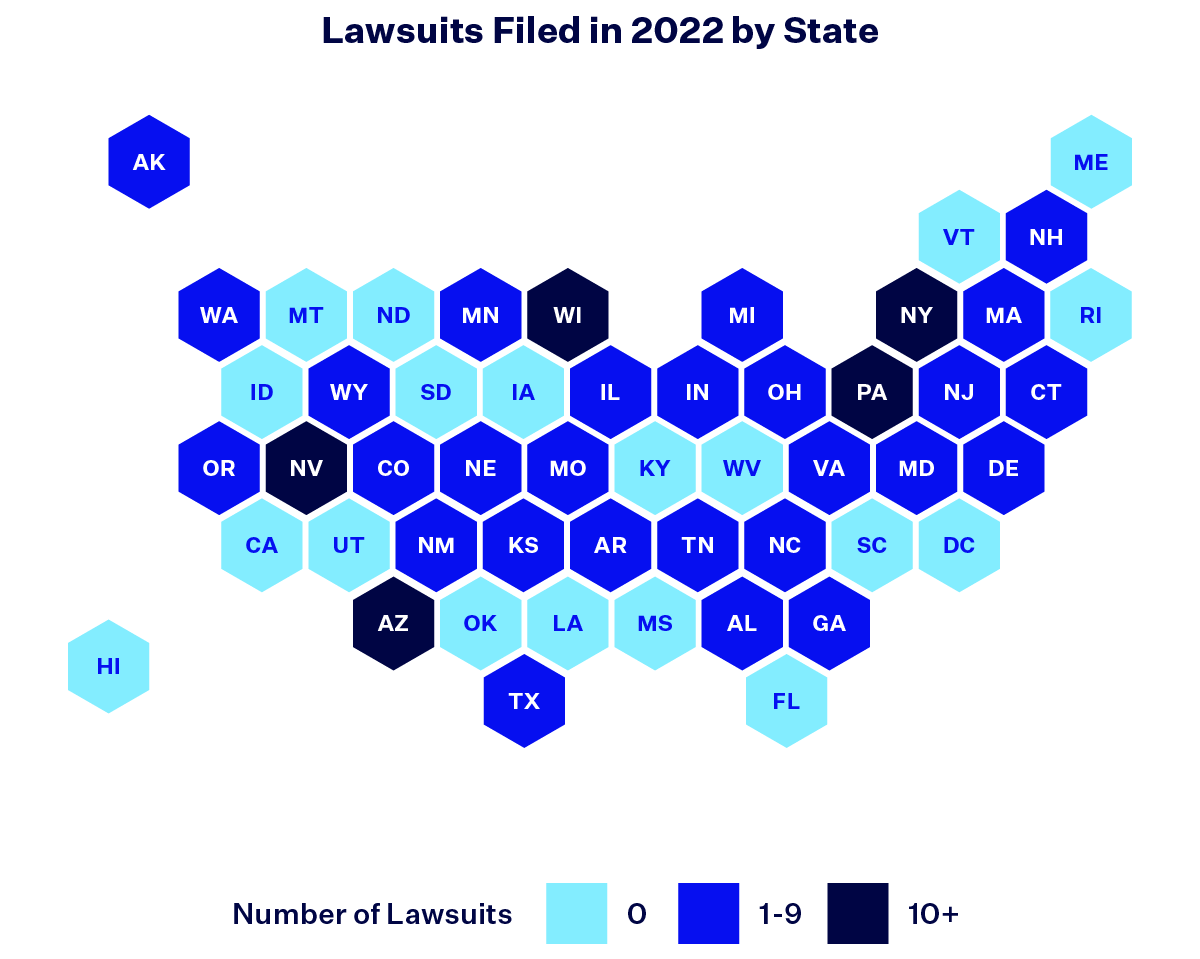
We tracked voting rights and election lawsuits filed over the course of 2022 in 31 different states. Arizona, Pennsylvania and Wisconsin were the top three most litigation-heavy states with 35, 21 and 16 new lawsuits filed last year, respectively. Unsurprisingly, these were all consequential battleground states with competitive state and federal races on the ballot, rendering them litigation targets — especially for the GOP — before and after Election Day.
Additionally, these three states were all hotbeds of rampant election denialism. Arizona and Pennsylvania are home to Republican counties that flouted state laws in the area of election administration and certification. In Arizona, Cochise County was the subject of litigation centered around hand counting ballots as well as the county’s refusal to certify its 2022 midterm election results. Similarly, in Pennsylvania, Berks, Fayette and Lancaster counties were sued for refusing to count certain mail-in ballots in their 2022 primary election totals.
Furthermore, throughout 2022, all three states played an integral role in the GOP’s litigation strategy aimed at undermining mail-in voting. In Wisconsin and Pennsylvania, Republicans’ proactive litigation focused on banning the use of drop boxes, which offer voters a secure and accessible 24/7 option for returning mail-in ballots, and disqualifying mail-in ballots for errors — such as an incomplete address or a missing/incorrect date — that are immaterial to voters’ eligibility.
A majority of the democracy-related lawsuits we tracked in 2022 were filed in state courts.
Out of the 175 democracy-related lawsuits filed in 2022 that we tracked, 76% (133 lawsuits) were filed in state court, while the remaining 24% (42 lawsuits) were filed in federal court. The disproportionate number of lawsuits filed at the state level underscores the profound impact of state courts and state constitutions in shaping our democracy. Out of the 133 lawsuits filed in state court last year, nearly 60% (79 out of 133 total) aimed to restrict voting access, while only 33% of the lawsuits filed in federal court last year sought to restrict voting access (14 out of 42 total). Although federal courts also played a role in the 2022 litigation landscape, state courts had an outsized impact, largely due to the fact that parties that filed democracy-related lawsuits primarily brought claims under state laws.
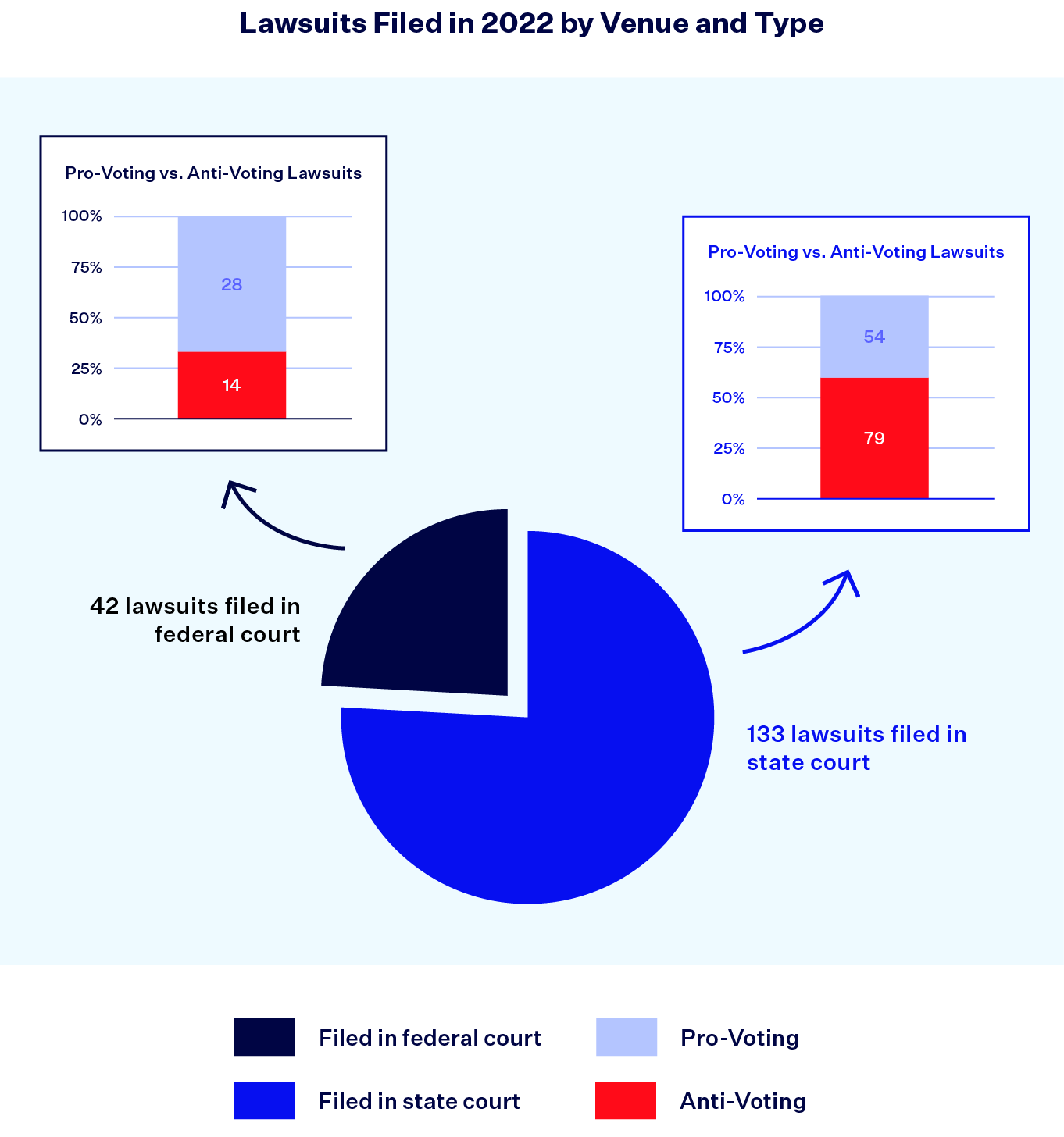
Attacks on mail-in voting and election administration were the focal point of 2022.
We broke down our dataset of democracy-related lawsuits filed in 2022 (excluding the 40 post-election lawsuits filed in 2022) by topic, sorting them into four main categories: vote by mail (51 lawsuits), election administration (47 lawsuits), in-person voting (28 lawsuits) and registration (22 lawsuits). (Some lawsuits fall within more than one of these four categories.)
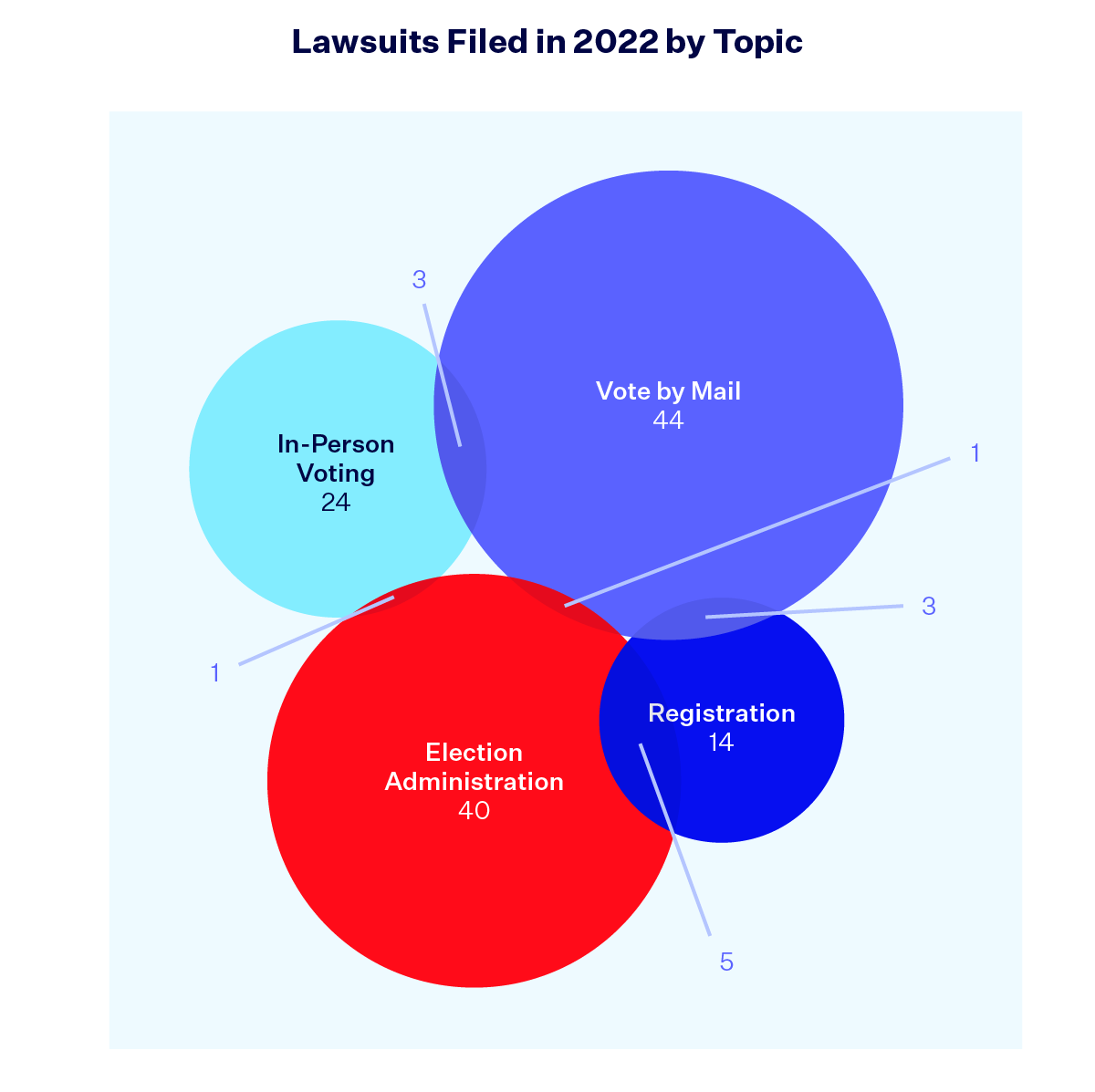
Attacking mail-in voting proved to be part and parcel of the Republicans’ litigation strategy in the aftermath of the 2020 election wherein former President Donald Trump and his expanding cadre of “Big Lie” proponents claimed that mail-in voting resulted in mass voter fraud. Ironically, Trump and his Republican allies espoused false claims and cast doubt on the mail-in voting process in states such as Arizona, where Republicans previously championed this method of voting and where voters have relied on the state’s mail-in voting system for decades. Accordingly, we saw a plethora of mail-in voting lawsuits filed in Arizona as well as numerous other states in 2022.
In Pennsylvania, Republicans mounted a successful legal challenge against guidance that allowed election officials to count undated or incorrectly dated mail-in ballots that were received on time. Also in the Keystone State, Republicans unsuccessfully attempted to block cure procedures (the process by which a voter may be notified of a technical mistake with their mail-in ballot and attempt to rectify that mistake) for the 2022 midterm elections.
Throughout 2022, Republicans also waged a war on drop boxes. In Wisconsin, one conservative group filed five separate lawsuits in a single day challenging the use of drop boxes throughout various major cities in the Badger State. Another large swath of mail-in voting lawsuits filed in 2022 concerned who is eligible to vote by mail. In Delaware, conservatives brought a successful challenge against the state’s new no-excuse mail-in voting law. On the other hand, the Massachusetts Supreme Court allowed the state’s new pro-voting law to remain in place following a GOP lawsuit. Meanwhile, in Arizona and Pennsylvania, Republicans filed lawsuits seeking to invalidate these states’ robust mail-in voting systems, both of which were supported by Republicans when they were initially implemented. Republican-backed lawsuits in Michigan and New York failed to restrict mail-in voting, consequently allowing voters to take advantage of their states’ mail-in voting opportunities during the 2022 midterm elections.
As we detailed in our GOP anti-voting report in September 2022, we saw a marked increase in the number of lawsuits aimed at the minutiae of election administration — the logistical aspects of running an election — which suggests an underlying shift in the GOP’s litigation strategy now aimed at undermining the foundational apparatuses of elections. Within the broader category of the 47 election administration lawsuits that we tracked, many involved voting machines, election workers and ballot initiatives.
In 2022, there was a sharp increase in the number of unconventional lawsuits challenging the use of electronic voting equipment. In Alabama, a group of Republicans filed a lawsuit — which was ultimately dismissed — against the use of certain voting machines, suggesting that these machines subject “voters to cast votes on an illegal and unreliable system.” In a somewhat similar lawsuit that was likewise dismissed, GOP election deniers Kari Lake and Mark Finchem, who ran for Arizona governor and secretary of state respectively, sought to end the state’s use of electronic voting machines. Other conspiratorial voting machines lawsuits were filed last year in states across the country, including Georgia, Minnesota, New Hampshire, Oregon, Pennsylvania and Virginia.
We also documented a notable uptick in the number of lawsuits that called into question the partisan composition of officials who run election operations. At a time when threats against election workers reached an all-time high and the country faced a national poll worker shortage, the Republican National Committee filed lawsuits regarding poll workers in Arizona, Michigan, Nevada and Virginia.
In 2022, we also tracked a handful of lawsuits over ballot initiatives. In Michigan, a pro-voting measure only ended up on the ballot for the 2022 midterm elections after a voting rights group filed a lawsuit asking the Michigan Supreme Court to place the initiative on the ballot because the state canvassing board deadlocked and failed to do so.
Although the number of lawsuits filed in 2022 largely fell into the vote by mail and election administration categories, we also monitored lawsuits pertaining to in-person voting (28 lawsuits) and registration (22 lawsuits). Most of the lawsuits in these two categories challenged more traditional voter suppression laws that were enacted with the intent of making it more difficult to register to vote or making it harder to vote in person on or before Election Day. Some lawsuits in these categories challenged in-person voting rules, including strict limitations on voter assistance or restrictions on the acceptable forms of ID required to vote. Still other 2022 lawsuits within the in-person voting category concerned efforts to either loosen or tighten regulations on partisan poll watchers ahead of the 2022 midterm elections. Lastly, on Election Day itself, we tracked 10 lawsuits that sought to extend polling location hours for various reasons, including delays in opening, printer issues, paper shortages and more.
In the aftermath of the 2022 elections, there was an outpouring of litigation related to election results, certification and more.
40 lawsuits filed last year fell into the post-election litigation category, meaning they were filed in the aftermath of an election and specifically pertained to the results of that election. Although there was a smattering of lawsuits (seven total) filed following the 2022 primary elections as well as a handful (five total) filed this year challenging election results from past years, most of the post-election lawsuits revolved around the Nov. 8, 2022 midterm elections (28 out of 40). In fact, lawsuits filed in the wake of the 2022 midterm elections constituted 16% of the total number of lawsuits filed this year. Below we breakdown and analyze these 28 post-2022 midterm elections lawsuits by category: election contests, recounts, certification, ballot counting/processing and other. The other post-election lawsuits that do not fall into a thematic category include litigation regarding Election Day procedures and Election Day records requests.
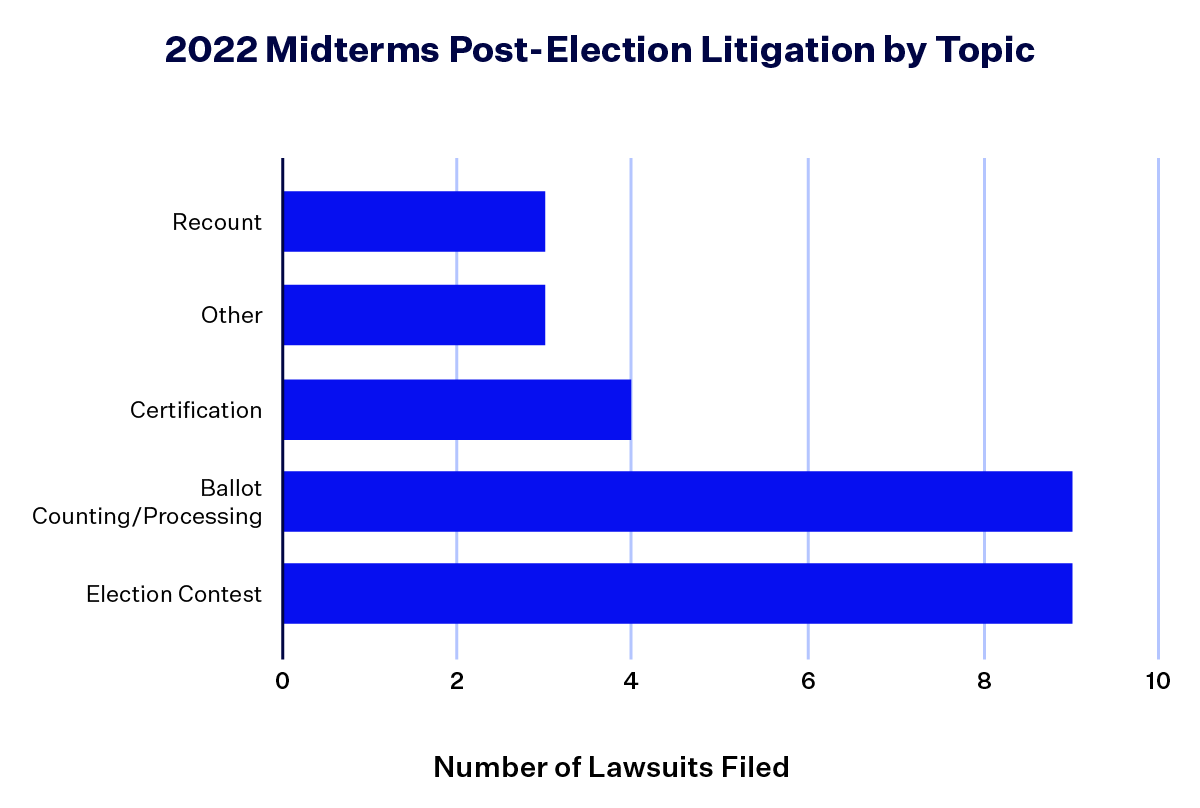
Most of the 2022 post-election litigation manifested in the form of election contests where candidates challenged the results of an election. Out of the nine election contests we tracked, all but one were filed in Arizona. These contests include those brought by election deniers and “Big Lie” proponents Kari Lake, Mark Finchem and Abraham Hamadeh, who lost their respective races for Arizona governor, secretary of state and attorney general.
In nine post-election lawsuits, candidates challenged the various methods utilized by election officials for counting and processing ballots. For example, the Republican candidate for New York’s 42nd state Senate district alleged that the “methodology employed in the counting of ballots” violates the New York Constitution and asked the court to declare her the “duly elected” winner.
Following the 2022 midterm elections, a few rogue counties — namely Cochise County, Arizona and Luzerne County, Pennsylvania — refused to perform their legally mandated and administrative duty of certifying election results and were sued as a result. Fortunately, after lawsuits were filed, both Cochise County and Luzerne County ultimately certified their 2022 election results.
After every election, courts oversee the recounting of ballots in particularly tight races. The 2022 midterms were no exception. In New York, both the Democratic and Republican candidates for the 50th state Senate District petitioned a court to order a manual recount of ballots cast. Following the court-ordered hand recount, the judge ordered the election to be certified, with the Democratic candidate winning by a 10-vote margin. (There are some local recounts that were not included in this dataset.)
In a litigation-heavy year, 175 lawsuits altered the voting rights landscape.
Overall, 2022 turned out to be a litigation-heavy election year, with democracy-related litigation filed on court dockets across the country. Republicans honed in on key states in which high profile races were on the ballot for the 2022 midterm elections. The GOP’s anti-voting litigation strategy relied heavily upon proactively attempting to upend mail-in voting and logistical aspects of elections. Concurrently, throughout 2022, a great deal of pro-voting lawsuits were filed that aimed to combat voter suppression and uphold our democracy’s promise of free and fair elections.
Throughout 2022, 175 court orders across 28 states impacted voters, with 116 victories and 35 losses for voters.
Just as there was an avalanche of democracy-related litigation filed in 2022, consequential orders were issued in a critical mass of cases last year. We tracked 175 consequential orders — both interim and final — that were issued during 2022 (this included orders in lawsuits that were filed before and during 2022).
Of the 175 consequential orders issued in 2022, 116 were victories for voters, 35 were losses for voters and 24 were neutral decisions. This is huge news: In 2022, democracy won in the courtroom.
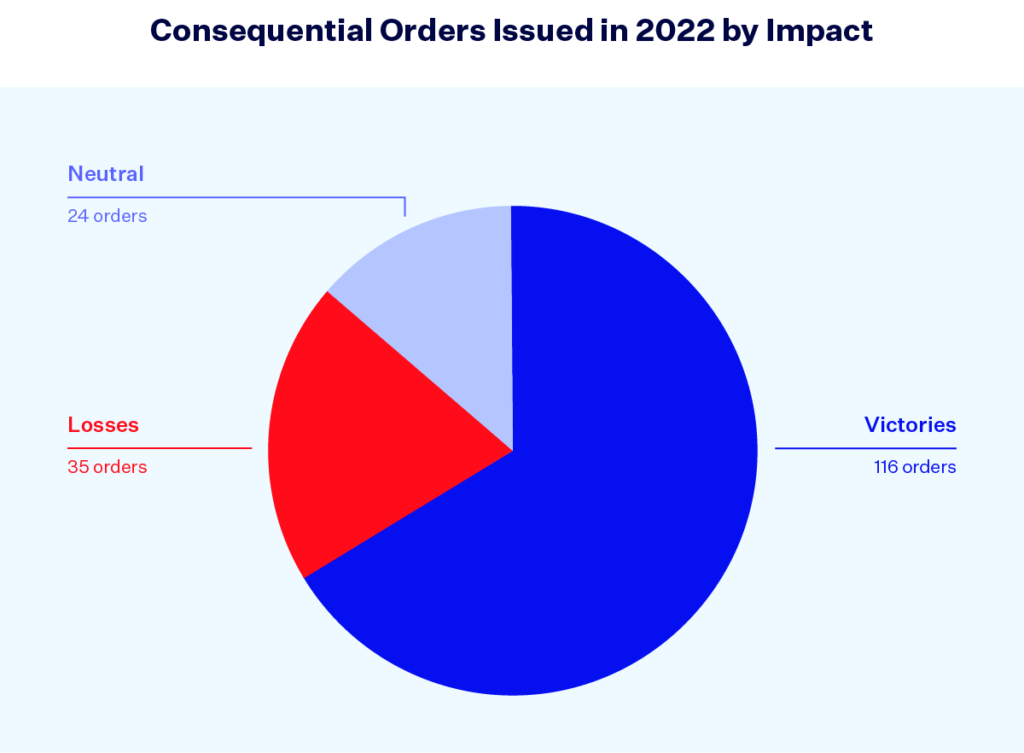
What is a consequential order and how do we categorize it?
For the purpose of this analysis, we defined a consequential order as any order that had an impact on voters and/or changed the course of a lawsuit. This is an umbrella term that has two subcategories: interim orders issued during an ongoing lawsuit that impacted voters and final decisions that ended litigation. Interim orders include preliminary or temporary injunctions, preliminary or temporary injunction denials, temporary restraining orders and temporary restraining order denials. Final orders include rulings, such as an opinion on the merits of a lawsuit or a settlement agreement, that signal the end of a lawsuit. We dive into each of these subcategories later in this report. Of the 175 consequential orders issued in 2022, 74 were interim orders and 101 were final orders.
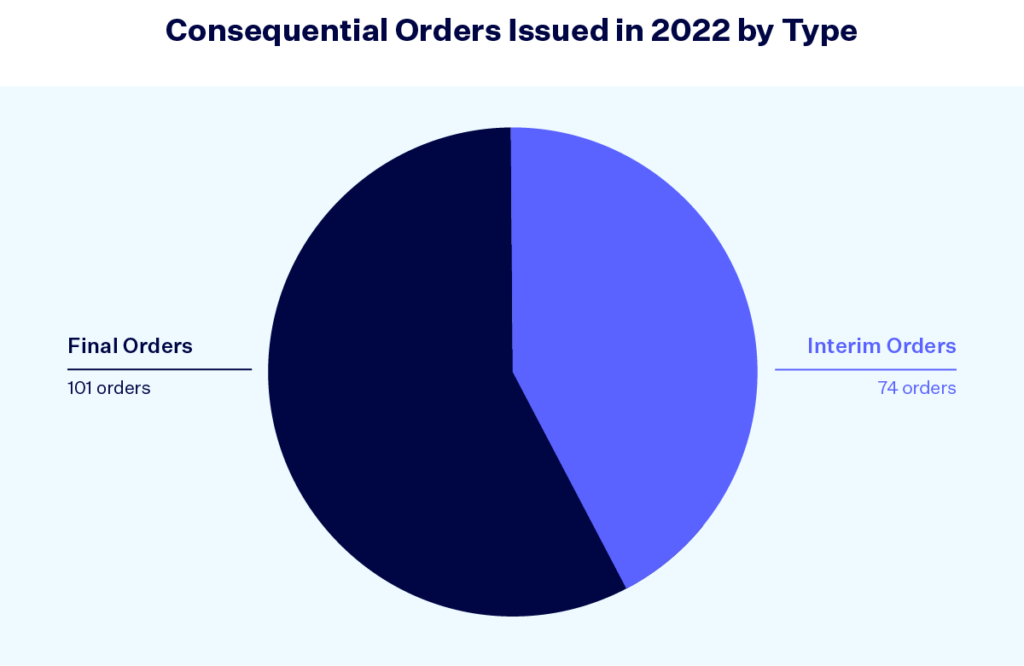
Democracy Docket categorized each consequential order as a victory, loss or neutral outcome. A victory is any court order that made it easier for people to vote or rejected anti-voting litigants’ attempts to curtail the democratic process. A neutral ruling is an order that maintained the status quo (such as if a lawsuit was voluntarily dismissed by the plaintiffs and no voting laws were changed). A ruling is considered a loss if anti-voting litigants were given their requested relief or if pro-voting litigants were not granted their requested relief.
- Victory: In Holmes v. Moore, the North Carolina Supreme Court struck down the state’s 2018 law providing a narrow list of qualifying photo IDs acceptable for voting after finding it violated the North Carolina Constitution.
- Neutral: In Democratic Party of Virginia v. Brink, the Democratic plaintiffs challenged two of Virginia’s election laws. After the plaintiffs’ claims challenging one law were dismissed by the judge, the parties agreed to dismiss the remaining claims before a final decision was made, leaving the status of the challenged laws unchanged.
- Loss: In Higgin v. Albence, the Delaware Supreme Court ruled that no-excuse mail-in voting and same-day voter registration violate the Delaware Constitution, striking down both pro-voter laws.
Voters benefited from 51 interim victories in 2022.
Interim orders were impactful last year in determining who could vote, how people could vote and whose votes counted. There were a total of 74 interim orders issued in 2022. Of these orders, 51 were victories, 18 were losses and five were neutral. The volume of interim orders demonstrates that while cases may still be active and ongoing, non-final decisions along the way significantly impacted voters in 2022. Given that relief is often needed on a quick timeline during an election cycle, interim orders are often the desired outcome of litigation seeking to protect voting rights ahead of fast approaching elections.
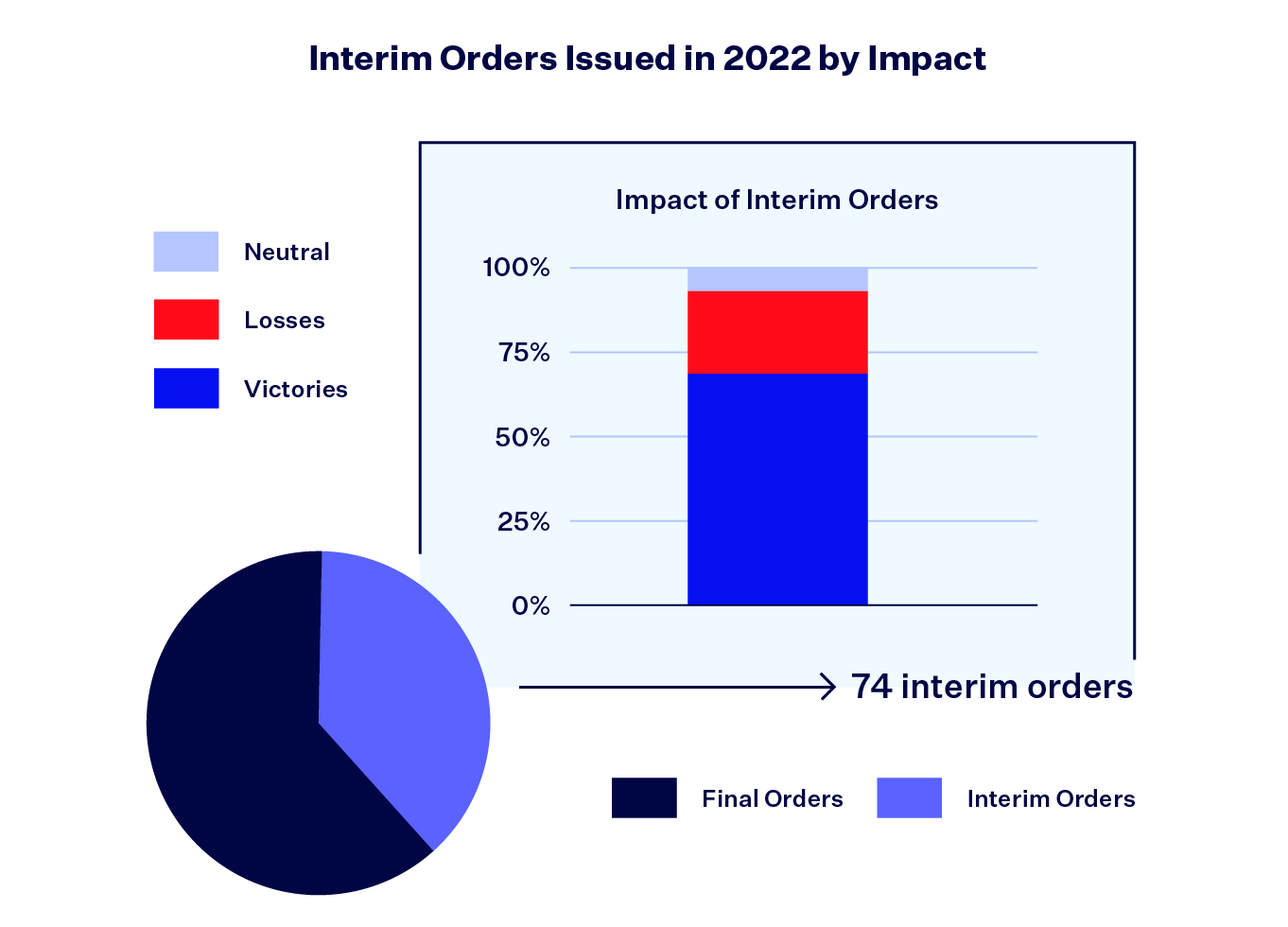
- Victory: In Arizona, a temporary restraining order was granted that prevented Clean Elections USA — a right-wing group — and its founder from intimidating voters at drop boxes in Arizona. Also in Arizona, a preliminary injunction was issued that prevented provisions of an Arizona voter suppression law from negatively impacting voters during the 2022 election cycle.
- Victory: In Wisconsin, a judge rejected a Republican request filed just three days before Election Day seeking to segregate and halt the counting of absentee ballots cast by voters in the military. The judge ruled that “every legitimate military vote should be counted” in the 2022 midterm elections.
- Loss: In Georgia, a request to block Georgia’s line-warming ban was denied, leaving it in place for the November elections.
Voters benefited from 65 final victories in 2022.
In addition to interim orders, final orders came down in a plethora of lawsuits last year as well. Of the cases we tracked that were filed either before and during 2022, 101 of them are now completely resolved. Of the cases with a final resolution last year, 65 cases (64%) ended in a victory for voters, 19 ended in a neutral manner and 17 ended in a loss for voters.
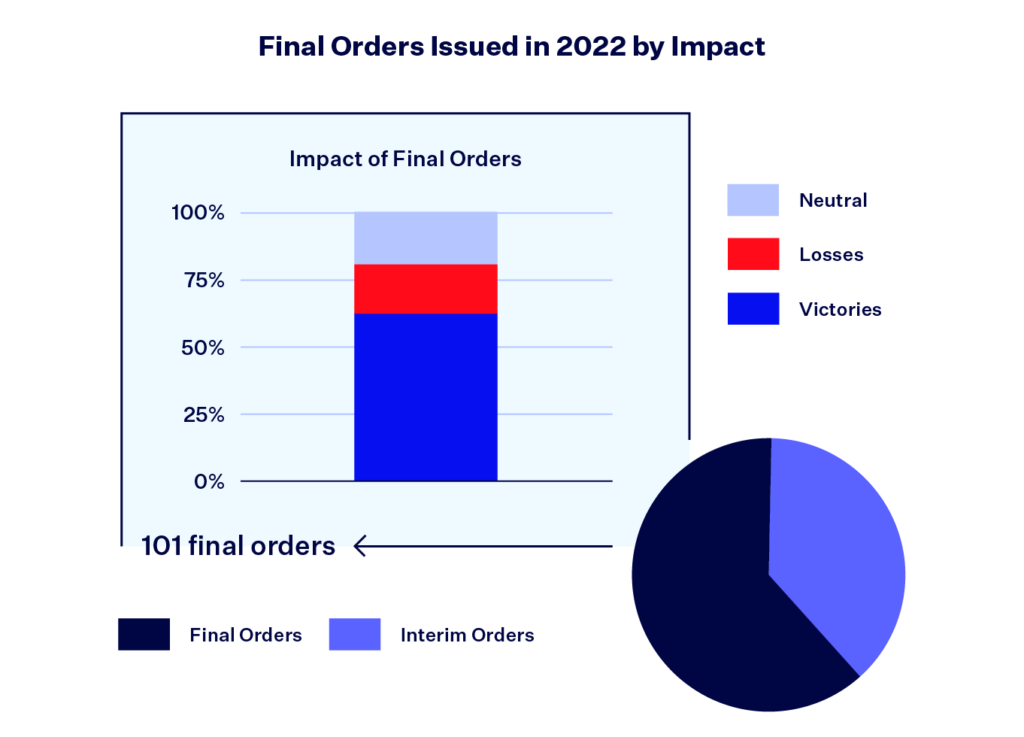
Here is a closer look at when final orders came down.
November was by far the busiest month for courts handing down final orders, as we saw a whopping 34 final orders closing out cases. August (12 final orders), September (10 final orders), October (13 final orders) and December (12 final orders) were also decision-heavy months.
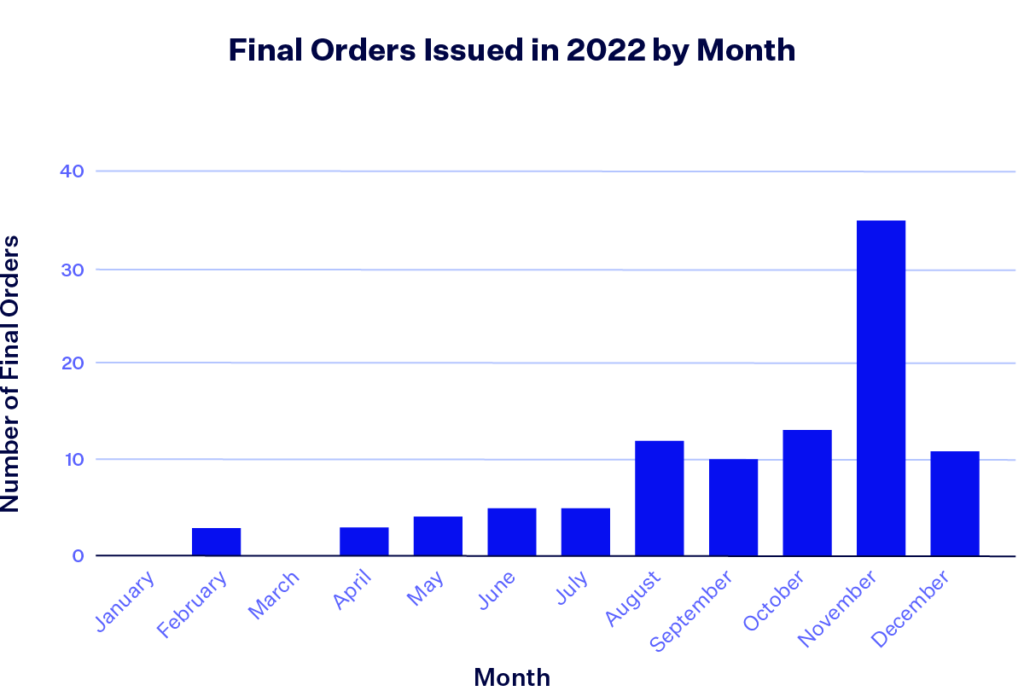
Let’s take a closer look at who contributed to last year’s voter victories.
In total, there were 116 voter victories last year that came from consequential orders. Sixty-one victories came from proactive litigation filed by pro-voting parties. Fifty-five victories came from cases in which anti-voting litigants brought lawsuits seeking to limit voting access through the court system, but failed.
Within these buckets of anti- and pro-voting lawsuits, we found that 29 victories originated from lawsuits that Republican litigants filed (and lost), while eight victories originated from lawsuits that Democratic litigants filed (and won). To put it simply, the combined losses of anti-voting litigants and victories of pro-voting litigants contributed to a wealth of voter victories in 2022.
Now, let’s take a closer look at where voting rights won.
Out of 125 orders (both interim and final) issued in state courts in 2022, 89 were victories. Out of 50 orders (both interim and final) issued in federal courts in 2022, 27 were victories. This means that, in the cases we tracked where consequential orders were issued in 2022, voting rights were protected 71% of the time in state court and 54% of the time in federal court. Of the state court victories, 33 came from interim orders while 56 were final orders. Of the federal court victories, 18 came from interim orders and nine were final orders.
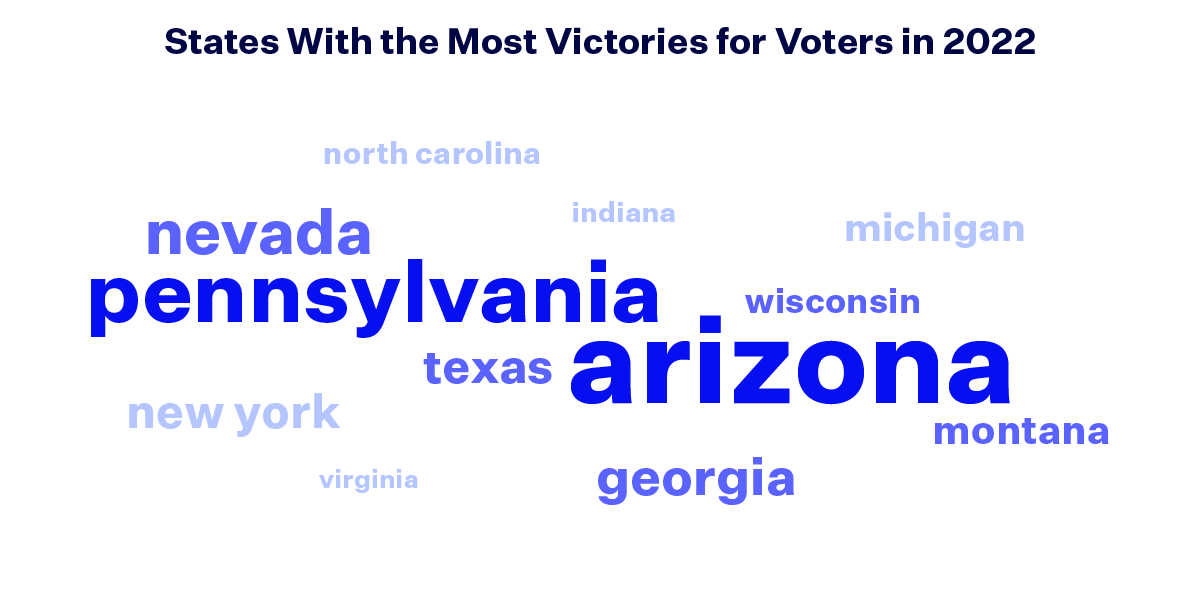
In states where a significant number of lawsuits were filed, there were also a significant number of victories. In 2022, the states with the most voter victories, either interim or final, were:
- Arizona (26)
- Pennsylvania (17)
- Nevada (12)
- Georgia (9)
- New York (8)
Each of these states saw a significant uptick in litigation before the 2022 midterm elections, but pro-voting positions disproportionately prevailed in court.
Anti-voting litigants appealed many voting rights victories in 2022.
Unfortunately, when courts issued rulings that benefitted voters in 2022, Republicans often appealed these decisions. Of the 65 victories that came from final orders, the Republican Party or Republican state officials appealed 25 — or 38% — of these decisions.
- A Georgia trial judge ruled that counties may hold early voting on Saturday, Nov. 26 (the Saturday following Thanksgiving). The state and Republican committees who intervened in this lawsuit appealed this decision, but a Georgia appellate court denied their request. The Republican committees then appealed to the Georgia Supreme Court, which ultimately denied their request and allowed early voting to be held on Saturday, Nov. 26.
- A Montana trial court permanently blocked three voter suppression laws in a full win for voters. However, Republican Secretary of State Christi Jacobsen appealed this decision to the state Supreme Court.
- A federal court struck down Texas voter suppression law Senate Bill 1111. However, Texas Attorney General Ken Paxton (R) and two counties appealed this decision. Ultimately, the 11th U.S. Circuit Court of Appeals reversed the district court’s decision, thereby reinstating S.B. 1111.
Of the 51 voter victories that came from interim orders last year, the Republican Party or Republican state officials appealed 11 — over one-fifth — of these orders.
When democracy was on the docket, voters won.
After a year in which the Republican Party filed a staggering number of lawsuits in an attempt to dismantle mail-in voting, upend election administration and otherwise undermine the democratic process, courts (and voters) largely rejected this strategy. The orders issued in democracy-related litigation throughout 2022 mostly benefited voters. Whether these orders struck down voter suppression laws passed by GOP legislators in Montana, added an extra day of early voting in Georgia for the U.S. Senate runoff, protected the mail-in voting process from GOP attacks in Pennsylvania or simply ordered rogue counties to certify election results in Arizona, when democracy was on the docket, voters won.